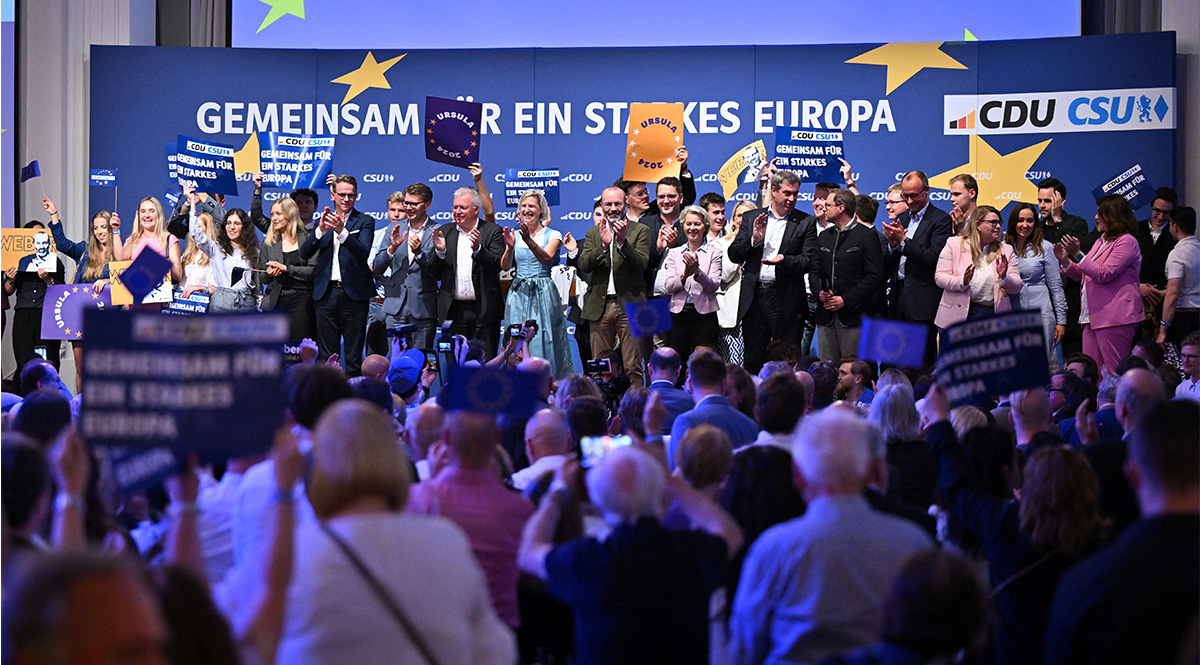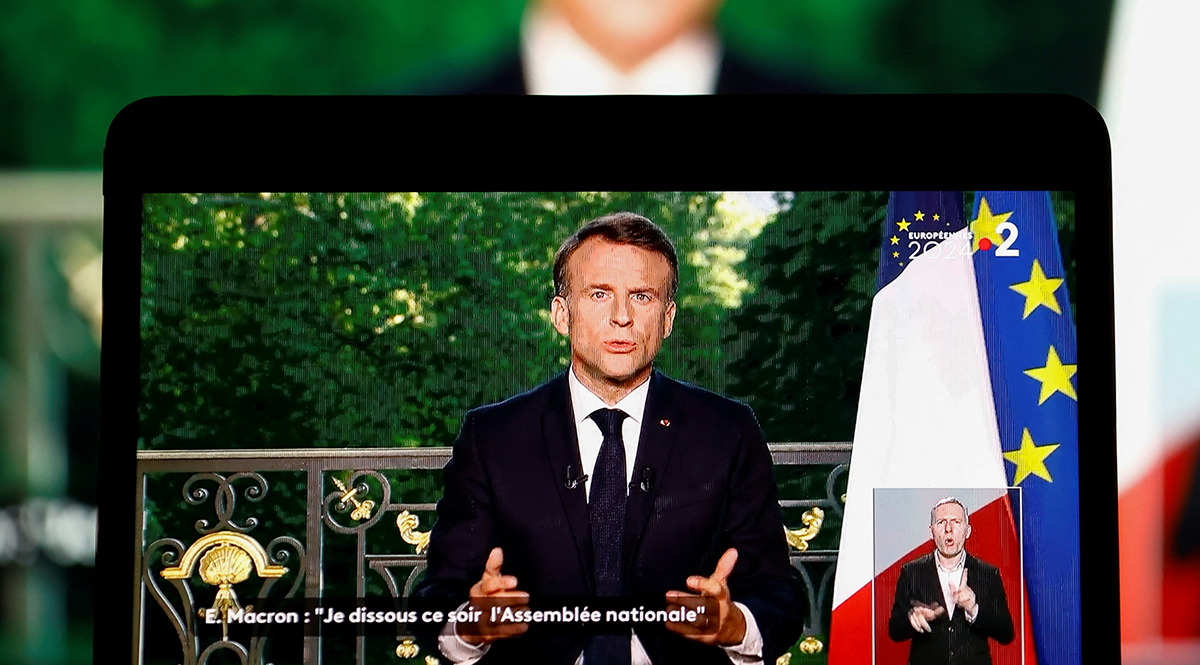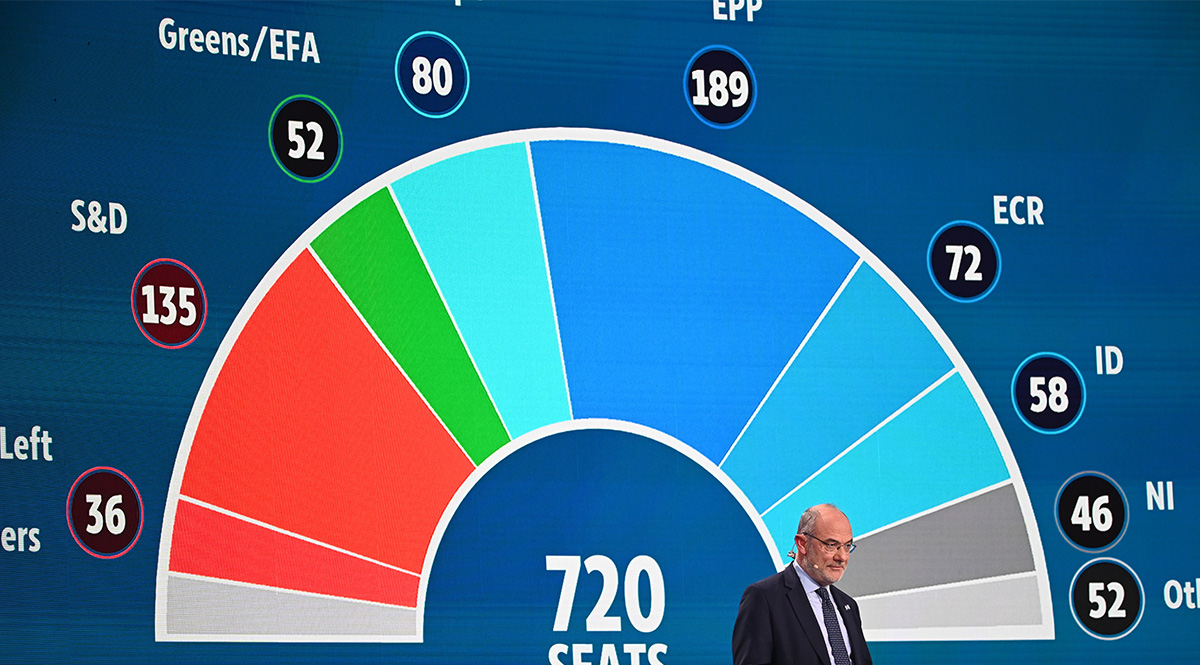German Politics Upended by European Parliament Elections
The European Parliament elections confirmed the strong position of the centre-right, as well as the rise of populist parties in Germany. The ruling coalition’s loss demonstrates public dissatisfaction with its performance in government and the leadership of Chancellor Olaf Scholz, and foreshadows a likely change of power after the Bundestag elections in 2025. Until then, the results of the European elections will not change the direction of Germany’s foreign policy, both on the EU or support for Ukraine.
 Lukas Barth / Reuters / Forum
Lukas Barth / Reuters / Forum
What were the election results and what influenced them?
The CDU/CSU, which are not in government, won a decisive victory (30%), but only gained 1.1% more votes compared to the 2019 elections. The populist, right-wing Alternative for Germany (AfD) achieved its best result ever (15.9%). The leader of the governing coalition, SPD, saw the weakest results (13.9%) in its history of European elections. The Greens also suffered defeat (12%). Moderate success was achieved by the social-conservative, pro-Russian Sahra Wagenknecht Alliance (BSW; 6%). The Liberals’ (FDP) ratings remained steady (5%).
The European elections were the first federal vote since the 2021 Bundestag elections. Thus, they had the character of a plebiscite on the achievements of the ruling coalition. For German voters, the most important topics during the campaign were security, understood as maintaining peace in Europe, limiting immigration, and social issues. Compared to 2019, the fight against climate change was not high on the list of public priorities. Scandals related to leading AfD candidates Maximilian Krah and Petr Bystron were the subject of discussion. The security services were investigating their ties to Russia and China (including allegations that they illegally accepted Russian funds and employ people suspected of spying for China). Krah had to suspend his campaign after a statement relativising the Nazi SS responsibility for crimes committed during World War II. However, these scandals scarcely hurt the AfD at the polls. In the final phase of the campaign—after the murder of a policeman by an Islamic extremist in Mannheim—the issue of deporting migrants who commit the most serious crimes in Germany became a hot topic.
What do the election results imply for the ruling coalition?
The position of the Social Democrats and Chancellor Scholz himself, who was the central figure of the election campaign, is significantly weakened. The argument that the Chancellor is a responsible politician in difficult times, whose cautious course on arms supplies to Ukraine is a guarantee of peace, was rejected by voters. Scholz is seen rather as a politician lacking leadership skills and unable to communicate his decisions. The coalition’s electoral weakness strengthens the position of Defence Minister Boris Pistorius, who, according to opinion polls, is Germany’s most popular politician. One can expect intra-party discussion in the SPD about the possibility of Pistorius replacing Scholz as the party’s candidate for Chancellor next year.
The biggest loser of the election is the Greens, who lost as much as 8% of their support compared to 2019. The party’s defeat is due to its failure to fully inform the public about the contents of the Green Deal and climate policy. Although the main reason for the spiking cost of living and, especially, energy prices is the war in Ukraine, some voters considered the Greens and the energy transition to blame for this situation.
The FDP’s result (5%) repeats its result from five years ago. It shows that the party is teetering on the brink of the electoral threshold and a loss of presence in the government by not being able—as the weakest coalition partner—to pursue liberal economic policies. Leaving the coalition, however, is unlikely, as it would risk further declines in support and burden the FDP with the odium of a party that led to the government’s collapse.
In the months ahead, conflicts in the coalition around the priorities for the near term can be expected to intensify ahead of the general elections. Faced with poor results in the EU vote, each of the parties that make up the “traffic light” coalition will try to emphasise their uniqueness and differences in stances in order to regain at least some of the lost support.
What do the results mean for the opposition?
The CDU’s victory strengthens the Christian Democrats and makes them the favourite in the 2025 Bundestag elections. The profile of CDU Chairman Friedrich Merz, who is an almost certain candidate for Chancellor, has increased. However, the Christian Democrats were unable to break through the 30% support ceiling in these elections, which may mean they will have to enter into a coalition with one or two of the parties that make up the current government after the Bundestag elections.
The AfD’s second place showing, despite the scandals, indicates the party’s strength and the discipline of its electorate, which is attracted to far-right and anti-EU slogans. The AfD is strongest in eastern Germany. The results of the AfD and BSW indicate the extent of German public support for the idea of returning to “dialogue” and energy cooperation with Russia instead of supporting Ukraine. The electorates of both parties also question the functioning of the EU in its current form. These views and the parties preaching them have become a permanent feature of the German political scene, although both AfD and BSW will be isolated at the federal level by the other parties at least until the 2025 elections.
How will the election results impact Germany’s foreign policy?
The results of the European Parliament elections will not significantly change the current direction and priorities of German foreign policy. The success of the CDU and the European People’s Party (EPP) grouping as a whole will strengthen Ursula von der Leyen’s bid for a second term as president of the European Commission. AfD deputies, who were excluded from the Identity and Democracy (ID) group after Krah’s SS statement, will not have a significant impact on parliamentary decision-making, even if they succeed in establishing another Eurosceptic faction in the EP.
Major changes also should not be expected in the government’s foreign policy approach. Financial and military support for Ukraine will continue, but with the current restrictions in place (blocking the delivery of longer-range Taurus missiles, opposition to sending military instructors to Ukraine). The result of the coalition’s defeat in the EU elections may be a greater focus by the Chancellor and the leadership of the SPD, the Greens, and the FDP on domestic policy, especially migration, social issues, and budgetary policy, at the expense of less involvement in the international arena.





